6 Easy Homemade Cleaning Sprays
In a previous post I shared how I made a set of color coded glass spray bottles for my homemade cleaning sprays. The spray bottles I bought came in a set of six and guess what? I basically have six favorite types of DIY natural cleaning sprays that I use so it all came together perfectly!
So Part 1 of this project was making the bottles, and Part 2 of this project was filling them with my favorite cleaning recipes that I’ll be sharing here today.
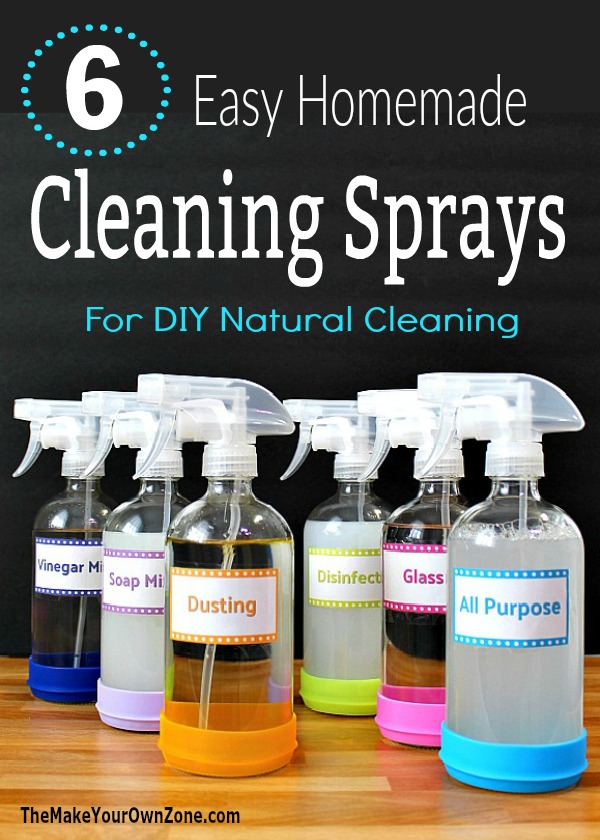
I’ve been making my own cleaners for the past 10 years now and over that course of time I’ve settled on these six categories of simple homemade cleaning sprays that can handle the majority of cleaning chores where you use a method of spraying and wiping. I’ve written about some of these recipes before and they’re scattered here and there around my blog, but I thought it would be nice to gather them all together here in one post and talk a little bit more about the benefits of each one.
Plus, if you want to make your own colorful spray bottles too and use my printable labels, these six recipes will go along with each label and get you started on your way to having a handy set of sprays for natural cleaning in your home.
Read Part 1 of this Post and get the labels here – – > DIY Colorful Spray Bottles with Labels
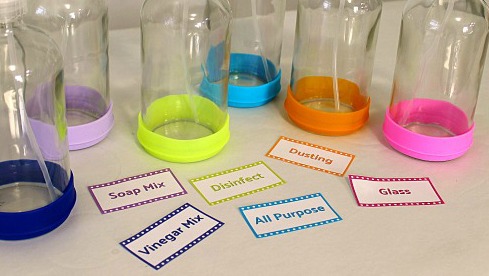
Occasionally I make slight variations on these recipes using different essential oils or different scented soaps, or perhaps I’ll try slightly different ratios for the mix of ingredients, but when it’s all said and done, the basic six categories remain the same.
These recipes are all very easy to make too and if you can measure and pour, then you can do it! And although no special tools are needed, a funnel (like these type of funnels) will sure come in handy for getting your liquids into your spray bottles.
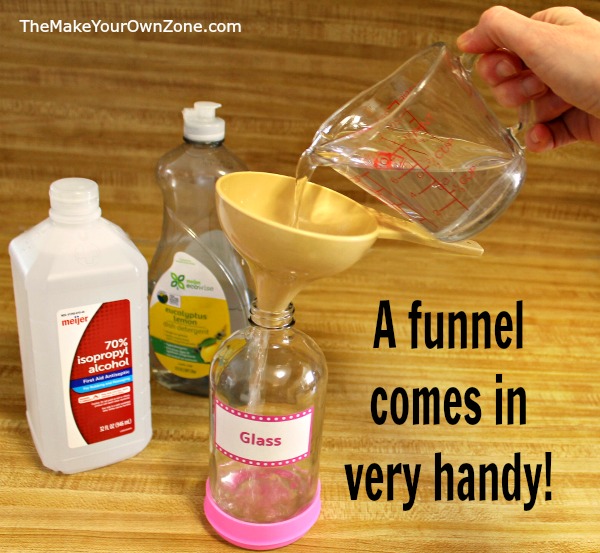
Ingredients for Easy Homemade Spray Cleaners
These six DIY spray cleaners all use ingredients that should be easy to find in stores. Here’s a little bit more info on each of the ingredients:
Water – Water is usually the main ingredient in these homemade spray cleaners which makes them a very frugal choice too. Regular tap water works fine.
Vinegar – You’ll want to use white distilled vinegar in these recipes (do not use apple cider vinegar).
Dish Soap or Castile Soap – most of the time I just use dish soap for the recipes that have soap in them, however castile soap can be used in these mixtures too. I’m most likely to use castile soap instead of dish soap in the soap mix spray where I like to make scented mixtures. Castile soap can be found in most big box stores such as Target these days too.
Borax and Washing Soda: One of these sprays uses borax (the all purpose spray) and another uses washing soda (the soap mix spray) I think borax has a little stronger cleaning power, but washing soda dissolves much easier. Borax and washing soda are sold in boxes in the laundry area of most stores. However if you don’t want to buy a big box of each of these just to use a little bit in a spray cleaner, you can substitute one for the other in these recipes. When using borax, start with very hot water when mixing the recipe together to help it dissolve. You can read this article about my strategy to prevent borax and washing soda from getting hard and clumpy You can also try this homemade laundry soap with no grated bar soap as a good way to put your extra borax and washing soda to good use.
Olive Oil – The dusting spray uses olive oil in the mixture but you could also use another oil (such as vegetable oil) if that’s what you have on hand.
Rubbing Alcohol – I use the common 70% Ispropryl alcohol than can be found in the pharmacy area of most stores.
Essential Oils – Finally, some of the spray recipes mention essential oils that can be added for scent. These are optional – EXCEPT for the disinfecting mixture. The disinfecting mixture needs the tea tree oil for the antibacterial power. Essential oil are becoming easier to find in stores such as Target too, and they are also easy to find online. My favorite essential oils to use in homemade cleaning sprays are (*affiliate links*) Lemon oil, Peppermint oil, Eucalyptus oil, and Tea Tree oil.
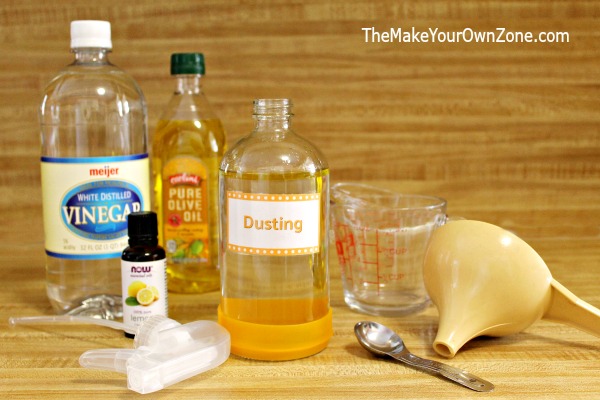
How To Make Your Own Cleaning Sprays
Here now are the recipes for my six go-to mixtures when I make my own cleaning sprays. There’s also a printable version of these six recipes at the end of this post.
#1 – All Purpose Cleaning Spray
This is the cleaner I grab first for the majority of my cleaning chores. It has a little bit of vinegar, a little bit of borax, and a little bit of soap – three things that will add power to a homemade cleaning spray. When making this spray, you need to start with very hot water and add the borax first, and then shake it really well to dissolve the borax. Then you can add in the vinegar and dish soap.
- All Purpose Cleaning Spray
- 1-3/4 cups Hot Water
- 1-1/2 teaspoons Borax
- 1/4 cup White Vinegar
- Squirt of Dish Soap
#2 – Soap Mix Spray
Soap is a good degreaser and I’ve found it’s helpful to have a homemade spray with a little bit more soap in it for this type of cleaning. My favorite place to use this spray is on my kitchen cupboard doors, however it’s a great spray for all purpose cleaning too especially if you prefer something without vinegar. I like to use a scented castile soap with a matching essential oil scent (my peppermint spray cleaner is an example of this type of combo).
- Soap Mix Cleaning Spray
- 2 cups Water
- 1/2 teaspoon Washing Soda
- 1 teaspoon Castile Soap or Dish Soap
- 8 to 10 drops essential oil (optional for scent)
#3 – Vinegar Mix Spray
I like to keep a spray that’s a vinegar and water mix around because these type of sprays can be great at cleaning away residue of other cleaners, particularly if you’ve used a soap that’s not rinsing away well. I’ve found that a vinegar mix spray will always leave a surface feeling squeaky clean. It makes a great all purpose cleaner too, just remember it’s acidic so don’t use it on soft stones like quartz or granite.
- Vinegar Mix Cleaning Spray
- 1 cup Water
- 1 cup White Vinegar
- 8 to 10 drops essential oil for scent (optional)
#4 – Dusting Spray
This is another cleaning recipe that I’ve used faithfully since I first tried it several years ago. This recipe has a little bit of olive oil in it for conditioning the furniture. My favorite essential oil to use in this mixture is lemon. The water and oil will separate when not in use, but a simple shake gets things back together again when you’re ready to use it.
- Furniture Dusting Spray
- 1-3/4 cups Water
- 1/4 cup White Vinegar
- 2 teaspoons Olive Oil
- 8 to 10 drops Essential Oil for scent
#5 – Glass Spray
When it comes to glass and mirrors, I prefer this mixture that uses rubbing alcohol in an equal amount with the water. Rubbing alcohol evaporates fast, making this homemade cleaner easier to wipe away. I also make this recipe in a smaller version for a homemade eyeglass cleaner.
- Glass and Mirror Spray
- 1 cup Water
- 1 cup Rubbing Alcohol (70% Isopropyl)
- 1/2 teaspoon Dish Soap
#6 – Disinfecting Spray
Finally, I like to keep a homemade spray around with ingredients for help with disinfecting. This mixture is a little heavier on the soap, and uses tea tree oil which is known to be a helpful antibacterial ingredient.
- Disinfecting Spray
- 1-1/2 cups Water
- 1/2 cup White Vinegar
- 2 Tablespoons Dish Soap
- 12 drops Tea Tree Essential Oil
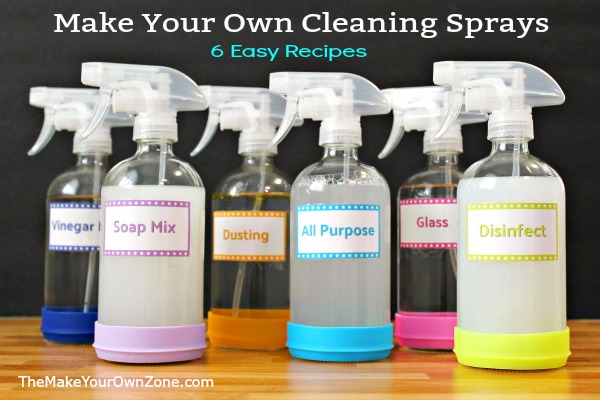
Here again is the link to Part 1 of this post with more about the bottles and the printable labels:
DIY Color Coded Spray Bottles and Labels.
Even if you don’t use these printable labels, I would encourage you to be sure to label your bottles in some way because as you can see in the photos, the mixtures look very similar to each other.
Have fun making one spray, two or three sprays, or all six sprays!
6 Easy Homemade Cleaning Sprays
Instructions:
- All Purpose Spray: 1-3/4 cups Hot Water, 1-1/2 tsp Borax, 1/4 cup White Vinegar, and a Squirt of Dish Soap. (Mix the hot water and borax first to dissolve the borax, then add the vinegar and dish soap).
- Soap Mix Spray: 2 cups Water, 1/2 tsp Washing Soda, 1 tsp Castile Soap or Dish Soap. 8 to 10 drops of essential oil (optional for scent)
- Vinegar Mix Spray: 1 cup Water, 1 cup White Vinegar, 8 to 10 drops Essential Oil (optional for scent).
- Dusting Spray: 1-3/4 cups Water, 1/4 cup White Vinegar, 2 tsp Olive Oil, 8 to 10 drops Essential Oil (optional for scent).
- Glass and Mirror Spray: 1 cup Water, 1 cup Rubbing Alcohol, 1/2 tsp Dish Soap.
- Disinfecting Spray: 1-1/2 cups Water, 1/2 cup White Vinegar, 2 Tbl Dish Soap, 12 drops Tea Tree Essential Oil.
More Homemade Cleaning Ideas:



Recipe for fruit and vegetable cleaner organic. Thank you
I have these ideas for cleaning produce, that includes a way to make a produce cleaning spray using vinegar too: https://www.themakeyourownzone.com/diy-ways-to-wash-produce/
1 cup water
1 cup vinegar
1 tablespoon baking soda
Juice of 1/2 lemon
Thank you! Can’t wait to use these;)
Hi Bev
What is your preference – 6 Easy Homemade Cleaning Sprays or Sal Suds Spray Cleaner (post Nov 19, 2020)?
Well, I’m really loving the all purpose Sal Suds cleaner and I probably could get by with just that. But I think I would still make the Disinfecting Spray and the Dusting Spray even if I had the Sal Suds replace the other four (glass, vinegar, all purpose, and soap mix)
Thank you so much for sharing. I will be trying these. They sound wonderful. Have been making my own laundry soap for years.
Would you mind sharing your laundry soap recipe?
Hi Bev,
I was looking for something to disinfect granite spaces like in the bathroom and kitchen. Would I just use the glass cleaner since that has alcohol?
You are correct that for granite you want to be sure not to use vinegar and use rubbing alcohol in the mixture instead. You can use the glass spray recipe, but I think I would back off just a bit on the alcohol in the mixture and do 1-3/4 cups of water with 1/4 cup of alcohol.
Ok I will make that. I noticed you had a Homemade Peppermint Soap Spray Cleaner so I made that as well. I haven’t used it yet but it smells like it makes everything really fresh and clean. I will use that one for general use on granite.
I use a granite cleaner and sealer product recommended for granite. Instructions given to me were to clean with hot soapy water for dirtier areas but use granite cleaner everyday and seal periodically. Not sure I would use anything else without checking with the granite experts (just me saying) as granite is expensive to begin with so would not want to damage the surface.
I just bought a jug of cleaning vinegar. You didn’t mention this type of vinegar. Does it always have to be diluted? Are there positives and negatives to using this type of vinegar?
My understanding is that cleaning vinegar has slightly higher acidity than regular vinegar. Because of that, I would say it would be best to use it diluted for cleaning unless it’s something really tough you’re working on like hard water spots. I wrote a post on the difference between regular vinegar and cleaning vinegar and it has had soooo many comments with different opinions. Here’s the link to that article: Regular vinegar vs. Cleaning vinegar